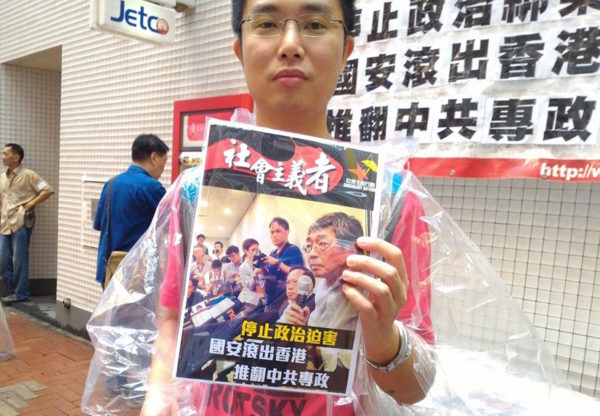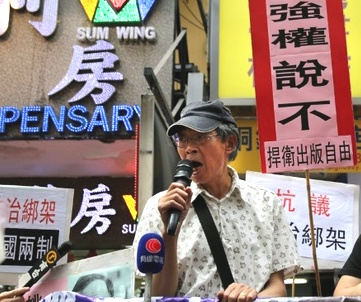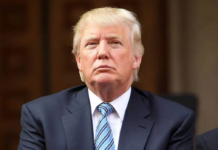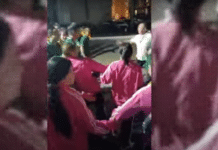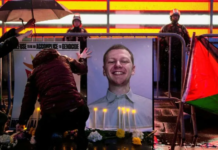Explosive first hand account of abduction ordeal exposes the gangster methods of China’s regime
Dikang, Socialist Action (CWI in Hong Kong)
Appearing at a Hong Kong press conference more than eight months after his abduction and disappearance at the hands of Chinese security personnel, bookseller Lam Wing-kee’s harrowing account has produced a wave of shock and anger in society.
Late last year, five booksellers from Causeway Bay Books in Hong Kong, disappeared one after the other under mysterious circumstances. Months later, the Chinese authorities admitted the men (Lee Bo, Liu Bo, Cheung Jiping, Gui Minhai and Lam Wing-kee) were in detention on the mainland, but erected a massive smokescreen to obscure how and why the five came to be there. Soon afterwards they were all paraded on national television making humiliating ‘confessions’. Most of the five have since been allowed to return to Hong Kong for short visits escorted by shadowy ‘friends’, believed to be mainland security officials. Until now, all of those released have stuck to the story that they were not abducted but have instead been helping the Chinese authorities ‘voluntarily’ – a story that almost nobody believes.
While many people were already convinced the men had been illegally abducted, Lam’s statement on Thursday, before the world’s press corps, has had the effect of bomb exploding upon the already tense political atmosphere of Hong Kong. The dictatorship’s smokescreen has collapsed! This case touches on the rawest of nerves as ordinary people in Hong Kong fear that the Chinese dictatorship is extending its political control over the city and dismantling the partial democratic rights it enjoys under the so-called ‘one country, two systems’ formula.
Anger and disgust against the Chinese and Hong Kong governments is surging as a result of this case. Lam’s public unmasking of the dictatorship’s gangster methods has to some extent reanimated the city’s pro-democracy movement, which has been in a state of shell shock since the 2014 struggle for universal suffrage ended in stalemate. A demonstration just two days after Lam’s reappearance, on Saturday 18 June, drew around 6,000 protesters chanting, “We are all Lam Wing-kee” and “Release the five booksellers!”
Political fallout
As Amnesty International’s director in Hong Kong, Mabel Au, put it, “Lam Wing-kee has blown apart the Chinese authorities’ story.” Every public statement made by the Chinese government and its foreign ministry in connection with this affair over the course of eight months is shown to be a lie.
Lam’s revelations represent a major political embarrassment for the Chinese regime, which of course has imposed a total media blackout inside China. This reveals the regime’s fragility – despite its public projection of ‘strength’ – as it increasingly strives for an ultimately unsustainable level of political control and repression in fear of mass unrest. Beijing’s attempt to silence and make an example of the five booksellers had the aim of closing down the booming business in political-scandal books published openly and legally in Hong Kong, but banned in China. The books have been extremely popular with the roughly 45 million mainland Chinese tourists visiting the city every year. Like many other dictatorships in history, the regime displays an overbelief in the effectiveness of police terror. This has now blown up in its face.
Likewise, the Hong Kong Government and police force are deeply compromised by this affair, with widespread suspicions they have acted in concert with the mainland’s national security apparatus. The unpopular Chief Executive, Leung Chun-ying, is exposed once again as a puppet of the Chinese dictatorship who cannot “protect his own citizens”.
The case of the five, “… is even worse than the failure to attain universal suffrage and Beijing’s interpretation of the Basic Law in 1999,” said Professor Lau Siu-kai, head of a pro-government think tank, referring to two major issues on which Beijing has aroused mass anger in Hong Kong in the past. Lau feared the incident would damage the pro-establishment camp in the upcoming legislative elections, predicting they could lose some seats.
At his press conference, Lam also expressed his distrust of the Hong Kong police, pointing to their role in “tear gassing unarmed students” in 2014. In fact, covert operations by mainland security operatives in Hong Kong is not new, despite this being explicitly forbidden under the ‘one country, two systems’ rulebook.
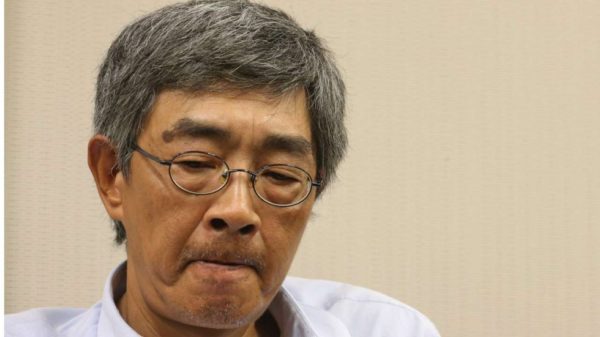
‘Globalisation’ of repression
Lam’s account of his detention reveals a series of violations of the Chinese dictatorship’s own laws, showing that to hunt down dissidents and critics it is increasingly resorting to extrajudicial methods and televised frame-ups. As chinaworker.info pointed out in our initial reports on the case of the five, this also “marks the ‘globalisation’ of Xi Jinping’s repression with little regard to how overseas governments may react.” The abduction last October of Lam’s colleague, Swedish citizen Gui Minhai, while on holiday in Thailand is a clear example of this.
The alleged ‘crime’ of Lam and the other four abductees, of publishing and distributing books that are banned in China, is not a crime in Hong Kong. With the seizure of Gui, and also of Lee Bo, the Chinese state crossed a line, copying the ‘extraordinary renditions’ practised by the US and its Central Intelligence Agency as part of its ‘war on terror’. Lee Bo’s story, surely forced upon him under duress, that he went to China ‘voluntarily’, has now been laid to rest by Lam’s account. Neither Lee Bo nor his captors have been able to explain how he entered China from Hong Kong without passing through any of its immigration points.
Lam told how he was arrested in Shenzhen in October, taken to the eastern city of Ningbo and held for months in solitary confinement and under 24-hour supervision to prevent him from committing suicide. He was forced to sign a waiver to forego his right, under Chinese law, to a lawyer and contact with his family. Even his toothbrush was tied to a string held by a guard – to prevent him from using it to hurt himself. In February, he was forced to make a scripted (literally) ‘confession’ on television: “I acted in front of the camera – I needed to. There was a director. I had to recite the script,” he said.
His captors allowed him to return to Hong Kong last week ostensibly to collect a computer hard disk containing details of the book company’s clients. Instead of doing so, Lam decided to defy his captors and go public about his ordeal.
“[The disappearances] can happen to you too for sure. If we don’t speak up, if I don’t speak up being the least of the five, then there is no hope for Hong Kong,” he told the press conference. There are well-founded fears for Lam’s safety and we would hope he and his supporters are taking stringent measures to protect him.
Lam’s account conforms with the accounts of other victims of state repression in China. Contributors to chinaworker.info and sympathisers of the CWI in China have revealed similar experiences, such as when arrested young socialist Zhang Shujie was allowed by his police minders to visit Hong Kong in 2012, in order – they believed – to attend a conference of left-wing activists organised by Socialist Action (CWI in Hong Kong) in order to spy on the participants. Instead of following this plan, Zhang escaped to Europe with the help of Socialist Action and CWI members internationally.
Another chilling aspect of Lam’s revelations is that he was not detained by national security, public security, police or military personnel but by the “central investigation team” – a shadowy unit accountable only to the leadership of the ruling ‘Communist’ Party (CCP), rather than an official state organ. This agency originated during the 1960s ‘Cultural Revolution’ when it was used to purge senior party figures. Later it was abolished, but has since been revived and plays a key role in President Xi Jinping’s purge of top-level opponents.
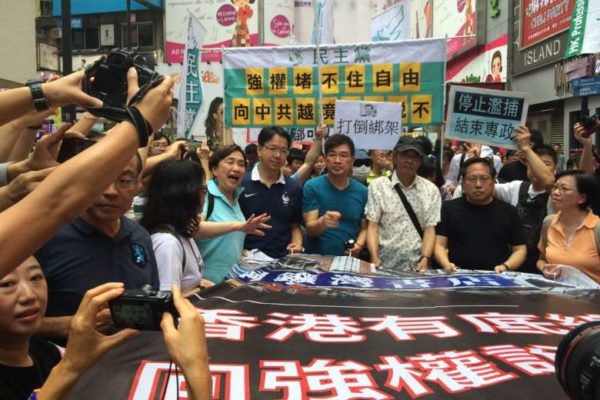
Localists at a loss
This affair also presents a political dilemma for Hong Kong’s right-wing localist movement, which advocates a vaguely defined independence from China. As recently as 4 June, the anniversary of 1989 Beijing massacre, the localists boycotted the mass commemoration in order to distance themselves from any support for the democracy struggle in China. This they argue has no relevance to the struggle in Hong Kong. Localist groups are also boycotting the latest protests in support of Lam and the booksellers.
As the case of the five demonstrates, the CCP’s repression and the increasing use of extrajudicial methods is being exported not only to ‘autonomous’ Hong Kong, but also to fully independent states such as Thailand, Myanmar and Laos, where the Chinese regime enjoys leverage over these governments and Chinese dissidents have been abducted in the past year. In yet another recent case, over 40 Taiwan citizens were deported from Kenya – to China – again showing the increasing diplomatic clout of the Chinese regime.
The localists’ claim to defend ‘Hong Kong interests’ but with a head-in-the-sand approach to the crimes of the Chinese regime against the Chinese masses. They oppose linking the mass struggles in Hong Kong with those developing in China. This is a recipe for politically disarming the struggle in Hong Kong against the dictatorship.
At the same time, the question needs to be asked: are the pan-democratic leaders drawing all the necessary conclusions from this scandal? While pan-democratic spokesmen and women correctly compare the Chinese regime’s actions to gangsters, they fail to point out that this is exactly what we expect – gangsters act like gangsters, dictators act like dictators! The task of the democracy movement in Hong Kong, and China, is not to try to teach the Chinese regime “good manners” as to how a civilised government should act – the task is to mobilise for the overthrow of this regime. This requires mass struggle linked across the border to overthrow capitalism and dictatorship.
Socialist Action calls for the immediate release of Gui Minhai, still held in mainland captivity, and the dropping of all the fake charges against the five booksellers. We call for the defence of freedom of expression and freedom of the press. In order to stop the reoccurrence of cross-border violations, we call for an independent committee of inquiry including representatives of the grassroots democracy movement, workers’ and media trade unions, along with rights lawyers, into these kidnappings and to examine the extent of mainland security agents operating illegally in Hong Kong. We demand the expulsion from Hong Kong of all covert mainland state security agents.
